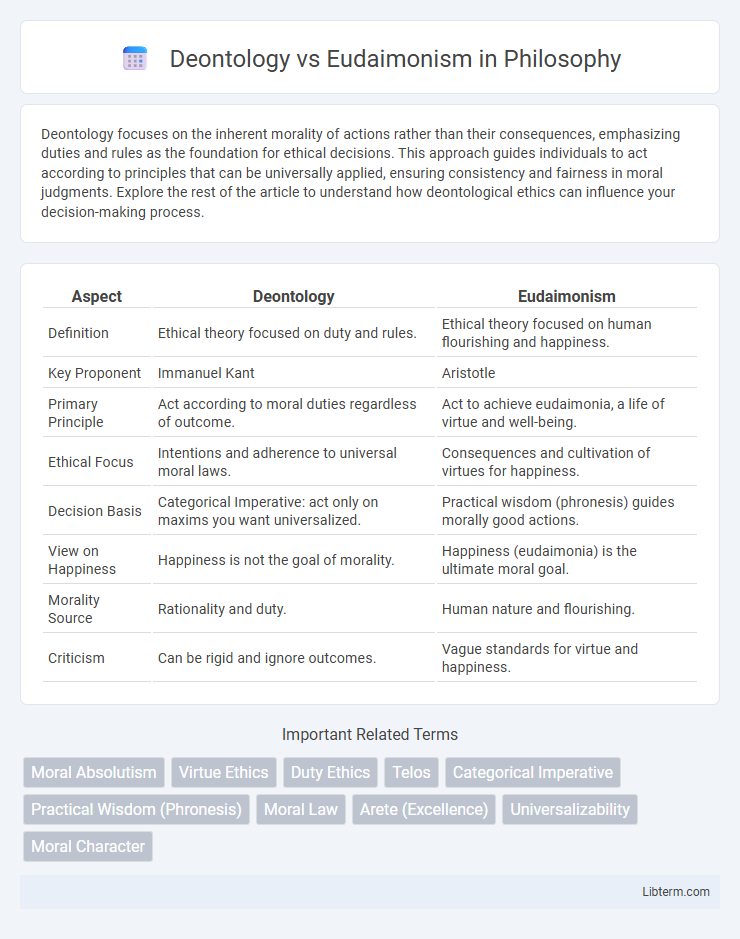Deontology focuses on the inherent morality of actions rather than their consequences, emphasizing duties and rules as the foundation for ethical decisions. This approach guides individuals to act according to principles that can be universally applied, ensuring consistency and fairness in moral judgments. Explore the rest of the article to understand how deontological ethics can influence your decision-making process.
Table of Comparison
| Aspect | Deontology | Eudaimonism |
|---|---|---|
| Definition | Ethical theory focused on duty and rules. | Ethical theory focused on human flourishing and happiness. |
| Key Proponent | Immanuel Kant | Aristotle |
| Primary Principle | Act according to moral duties regardless of outcome. | Act to achieve eudaimonia, a life of virtue and well-being. |
| Ethical Focus | Intentions and adherence to universal moral laws. | Consequences and cultivation of virtues for happiness. |
| Decision Basis | Categorical Imperative: act only on maxims you want universalized. | Practical wisdom (phronesis) guides morally good actions. |
| View on Happiness | Happiness is not the goal of morality. | Happiness (eudaimonia) is the ultimate moral goal. |
| Morality Source | Rationality and duty. | Human nature and flourishing. |
| Criticism | Can be rigid and ignore outcomes. | Vague standards for virtue and happiness. |
Introduction to Deontology and Eudaimonism
Deontology is an ethical theory that emphasizes duties and rules, asserting that actions are morally right based on adherence to obligations regardless of consequences. Eudaimonism centers on the pursuit of human flourishing and happiness, defining morality through the cultivation of virtues that lead to a fulfilling life. Both frameworks offer distinct approaches to moral decision-making, with deontology focusing on objective principles and eudaimonism prioritizing individual well-being and character development.
Historical Origins and Philosophical Foundations
Deontology traces its historical origins to Immanuel Kant's 18th-century moral philosophy, emphasizing duty, rules, and the categorical imperative as foundational ethical principles. Eudaimonism, rooted in ancient Greek philosophy, particularly Aristotle's Nicomachean Ethics, centers on achieving eudaimonia, or human flourishing, through virtue and rational activity. These philosophical foundations highlight deontology's focus on objective moral laws versus eudaimonism's emphasis on the cultivation of character and well-being for a fulfilled life.
Core Principles of Deontological Ethics
Deontological ethics centers on the inherent morality of actions based on adherence to duty and rules, emphasizing that certain actions are intrinsically right or wrong regardless of consequences. This ethical framework, largely influenced by Immanuel Kant, prioritizes universal maxims and the categorical imperative, which demands acting in ways that can be consistently willed as universal laws. Unlike eudaimonism, which values virtue and human flourishing as the ultimate good, deontology asserts that moral obligation arises from rationality and respect for persons as ends in themselves.
Key Concepts in Eudaimonism
Eudaimonism centers on the concept of eudaimonia, often translated as flourishing or well-being, which is the ultimate goal of human life according to Aristotle and other virtue ethicists. It emphasizes cultivating virtues such as courage, temperance, and wisdom that contribute to living a fulfilling and meaningful life. Unlike deontology's focus on duty and moral rules, eudaimonism prioritizes character development and the achievement of holistic human excellence.
Duty-Based Morality vs Virtue-Based Living
Deontology centers on duty-based morality, asserting that actions are morally right or wrong based on adherence to rules or obligations regardless of consequences. Eudaimonism emphasizes virtue-based living, where moral behavior stems from cultivating character traits that lead to human flourishing and well-being. The fundamental distinction lies in deontology's focus on moral duties and universal laws, while eudaimonism prioritizes personal virtues and the pursuit of a flourishing life.
Notable Philosophers: Kant and Aristotle
Immanuel Kant's deontology emphasizes duty and adherence to moral laws regardless of consequences, asserting that actions are morally right if they fulfill categorical imperatives. Aristotle's eudaimonism centers on achieving eudaimonia, or human flourishing, through the cultivation of virtues and rational activity in accordance with one's nature. Both philosophies offer foundational ethical frameworks, with Kant prioritizing universal moral duties while Aristotle advocates for the development of character and practical wisdom.
Practical Implications in Modern Life
Deontology emphasizes adherence to moral duties and rules, guiding decisions with clear ethical standards that prioritize actions over outcomes in modern contexts such as law, healthcare, and business ethics. Eudaimonism focuses on achieving human flourishing and well-being through virtues, encouraging individuals to cultivate character traits that lead to a fulfilling and meaningful life. Practical implications include deontological frameworks shaping policies with strict compliance criteria, while eudaimonistic approaches influence personal development and holistic well-being programs.
Strengths and Criticisms of Deontology
Deontology's strength lies in its clear moral framework based on duty and universal principles, ensuring consistent ethical decision-making regardless of outcomes. Critics argue this rigidity can lead to conflicts between duties and ignore the consequences of actions, potentially resulting in morally questionable outcomes. The theory's emphasis on intention over results challenges practical application in complex, real-world situations where context and consequences matter.
Strengths and Criticisms of Eudaimonism
Eudaimonism emphasizes the pursuit of human flourishing and well-being, promoting a holistic view of ethics that integrates virtues, happiness, and meaningful life goals. Its strength lies in fostering personal development and moral growth by encouraging individuals to live authentically according to their true nature and values. Criticisms of eudaimonism include its potential subjectivity in defining what constitutes flourishing and the challenge of applying its principles universally across diverse cultures and situations.
Comparative Analysis and Contemporary Relevance
Deontology emphasizes duty-based ethics grounded in universal moral laws, prioritizing the inherent rightness of actions regardless of outcomes. Eudaimonism centers on achieving human flourishing through virtuous living and the fulfillment of one's potential, aligning morality with personal and collective well-being. Contemporary relevance reveals deontology's influence in legal frameworks and human rights, while eudaimonism informs positive psychology and holistic approaches to ethical development.
Deontology Infographic

 libterm.com
libterm.com